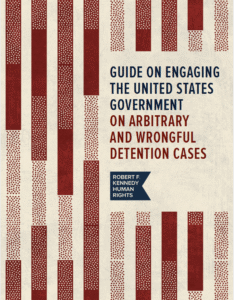In the lead up to the 2015 parliamentary elections in the Federal Democratic of Ethiopia, the Ethiopian government used violence, intimidation, and repressive legislation, to brutally restrict democratic and political space. Such actions allowed the ruling Ethiopian People’s Revolutionary Democratic Front (EPRDF) to claim all of the 547 in Parliament, despite international concerns that the political environment was not conducive for free and fair elections. Robert F. Kennedy Human Rights released a briefing paper documenting the range of human rights violations that took place in the context of Ethiopia’s 2015 parliamentary elections. Now, a year later, incidents of repression continue to mount, as the government has violently suppressed peaceful protests and dissent. The drafting of new laws, including a new cyber crime law, further restricts the free flow of information or public debate.
Despite the systematic closing of civic space, a new protest movement emerged in the Oromia region in November 2015 sparked in part by a government plan to expand the administrative border of the capital of Addis Ababa into the Oromia region. Ethiopian security forces responded to a series of peaceful demonstrations with excessive force, leading to injuries, arbitrary arrests, and deaths estimated at well over 200 people.
The Ethiopian government has also resorted to a series of sham trials and arrests targeting Ethiopians who choose to peacefully express themselves. Many of those arrested have been charged under the country’s Anti-Terrorism Proclamation and Criminal Code for their alleged involvement with various proscribed “terrorist” groups. For instance, on December 23, 2015, Ethiopian authorities arrested Bekele Gerba, deputy chairman of the Oromo Federalist Congress (“OFC”) for the second time since 2011 in suspicion of his alleged involvement with the Oromo protest movement. Bekele Gerba and 22 other individuals were detained in deplorable conditions for four months before they were charged in April 2016 under the country’s Anti-Terrorism Proclamation. Bekele Gerba and the 22 others remain in detention while facing trial.
Similarly, Yonatan Tesfaye Regassa, the former head of public relations for the opposition Semayawi Party (Blue Party) was charged with “planning, preparing, conspiring, inciting, and attempting to commit terrorist acts” for his alleged support of the Oromo Liberation Front (“OLF”)’s objectives after his critical stance of the government’s violent response to the Oromo protests on Facebook. Tesfaye’s charges however, failed to provide any evidence supporting a causal link between Tesfaye and the OLF.
Zelalem Workagegnehu, a blogger and journalist, was convicted under Ethiopia’s Anti-Terrorism Proclamation in April 2016 after being arbitrarily detained for nearly two years. The authorities used Zelalem’s Facebook posts and conversations as persuasive evidence of his connection with the banned opposition group. The trials of Bekele Gerba, Yonatan Tesfaye, and Zelalem Workagegnehu all failed to meet international fair trial standards, and each was subjected to cruel, inhuman, and degrading conditions during their confinement.
On March 8, 2016, 20 Oromo Addis Ababa University students were arrested while peacefully demonstrating at the US Embassy gate, in protest to the ongoing human rights abuses in the Oromia region. While the exact nature of the prosecutor’s charges and evidences against them is presently unclear, their arrests come in the wake of an increased crackdown on peaceful dissent in Ethiopia.
The government has also approved a controversial cybercrime bill aimed at controlling and prosecuting criminal activities carried out on computers. The proclamation is troubling in many respects. For one, the law contains vague and overly broad language that threatens punishment for “disseminating information that results in public disorder or violence.” As drafted, the law can be misused by authorities to target ordinary citizens, journalists, and bloggers who express views in opposition to government policies or report on events unfavorable to the government. Messaging applications, such as Twitter, Whatsapp, and Facebook were reportedly inactive in parts of the country during the unrest in the Oromia region. The law will undoubtedly have a chilling effect on the flow of information and the right to freedom of expression online.
The Ethiopian government has continued to restrict civic and political space in the country since the 2015 elections, limiting the ability of independent voices to peacefully engage or express their views. By invoking threats to national security the government has justified attacks, arbitrary detention, and malicious prosecution of bloggers, students, and other citizens. The government’s systematic crackdown on freedom of expression, assembly, and association not only violates Ethiopia’s Constitution and its international human rights obligations, but has fostered a hostile environment for civil society and created a culture of impunity for government abuses.




